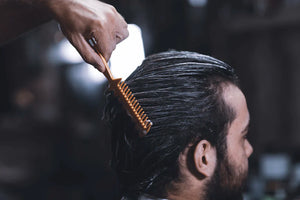Manage Your Hair Regrowth Expectations Wisely
Feb 19, 2025
Frequently Asked Questions
1. What are the common causes of hair loss?
2. How does Minoxidil work for hair regrowth?
3. What is the typical timeframe to see results from Minoxidil?
4. How can I maintain a positive mindset during my hair regrowth journey?
5. Should I consult with a professional about my hair loss?
When it comes to hair regrowth treatments, setting the right expectations is crucial. The journey towards achieving healthier, fuller hair can be both exciting and challenging. With options like Minoxidil for women, many are eager to see results, but understanding the process is key to a positive experience. This guide will help you manage your expectations while navigating through hair regrowth treatments, ensuring you stay motivated and informed.
Understanding Hair Loss and Regrowth
Before diving into treatment options, it’s essential to understand the basics of hair loss. Various factors contribute to hair thinning, including genetics, hormonal changes, and stress. Each type of hair loss can impact your overall approach to treatment.
Common Causes of Hair Loss
- Genetic Factors: Hereditary hair loss can affect both men and women, leading to thinning hair over time.
- Hormonal Changes: Fluctuations in hormones, especially during pregnancy or menopause, can contribute to hair shedding.
- Medical Conditions: Conditions like thyroid issues or autoimmune diseases may also play a role in hair loss.
- Stress and Lifestyle: High-stress levels, poor nutrition, and lack of sleep can exacerbate hair thinning.
Being aware of these factors provides a clearer understanding of the challenges you might face and empowers you to choose the right products to support hair regrowth.
Exploring Hair Regrowth Treatments
With a plethora of hair regrowth options available, it’s essential to pick a treatment that aligns with your needs and lifestyle. Among the options, Minoxidil for women has gained popularity for its effectiveness in stimulating hair growth.
How Minoxidil Works
Minoxidil is a topical solution that works by improving blood flow to the hair follicles. This action nourishes the hair roots while prolonging the growth phase of the hair cycle. The result? Healthier hair with the potential for regrowth in areas where thinning has occurred.
It’s important to note that while Minoxidil is effective for many, results can vary significantly from person to person. This variability is influenced by factors such as the extent of hair loss, individual genetics, and adherence to the treatment regimen.
Setting Realistic Goals
One of the most critical aspects of any hair regrowth journey is setting realistic expectations. Here are some key points to consider:
The Hair Growth Cycle
Understanding that hair grows in cycles can help shape your expectations. Each hair strand undergoes three phases: anagen (growth), catagen (transition), and telogen (resting). Hair typically grows at a rate of about half an inch per month during the anagen phase, and visible results from treatments can often take several months. Patience is essential!
Timeframe for Results
When using a treatment like Minoxidil for women, most individuals begin to notice improvements after three to six months. However, for some, it may take a little longer. It's crucial to remember that consistent application is vital for seeing results, and expecting immediate changes can lead to disappointment.
Maintaining a Positive Mindset
Embarking on a hair regrowth journey can be overwhelming, but maintaining a positive mindset can significantly impact your experience. Here’s how to stay motivated:
Celebrate Small Wins
As you progress, acknowledge any positive changes, no matter how minor they may seem. Whether it’s an improvement in hair texture or reduced shedding, celebrating these small victories will help keep your morale high.
Stay Informed and Educated
Continuously educate yourself about hair health and treatment options. Knowledge empowers you and helps you make informed decisions throughout your journey.
Common Misconceptions About Hair Regrowth Treatments
There are several myths surrounding hair regrowth that could lead to unrealistic expectations. Let’s debunk some common misconceptions:
Myth: Hair Regrowth Treatments Work for Everyone
While many find success with treatments like Minoxidil for women, it’s not guaranteed for everyone. Each individual is different, and results vary.
Myth: Once You Stop Using Treatments, Hair Will Fall Out
It is true that stopping treatment can lead to a reversal of benefits over time, typically within a few months. However, this doesn’t mean you will lose all your hair. It’s about maintaining the health you’ve achieved with the treatment.
Holistic Approaches to Supporting Hair Growth
Incorporating holistic practices alongside regrowth treatments can enhance your hair health. Consider adding the following to your regimen:
Healthy Diet
Nutrition plays a vital role in hair health. Ensure you consume a balanced diet rich in vitamins and minerals. Nutrients such as biotin, zinc, and vitamins A and E promote hair strength and growth.
Stress Management Techniques
Stress is closely linked to hair loss. Integrating stress-reducing practices like yoga, meditation, or deep-breathing exercises can help maintain overall wellbeing, which in turn benefits your hair health.
Regular Scalp Care
Taking care of your scalp is equally important. Regularly massaging your scalp can increase blood circulation, further supporting hair growth. Consider using essential oils known for their beneficial properties for scalp health.
Consultation with Professionals
While self-educating is beneficial, consulting with a healthcare professional or dermatologist can provide tailored guidance based on your unique hair loss situation. They can assess your condition, suggest a personalized treatment plan, and help you set achievable goals.
Your Journey to Fuller Hair Awaits
Managing expectations with hair regrowth treatments like Minoxidil for women is crucial for a successful journey. By understanding the factors influencing hair loss, setting realistic goals, and maintaining a positive mindset, you can navigate this path with confidence. Remember, while the road to regrowth may have challenges, the results can ultimately lead to a renewed sense of self and beauty. Embrace the journey ahead, and watch your hair thrive!

